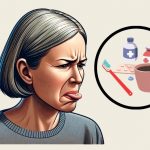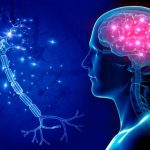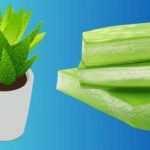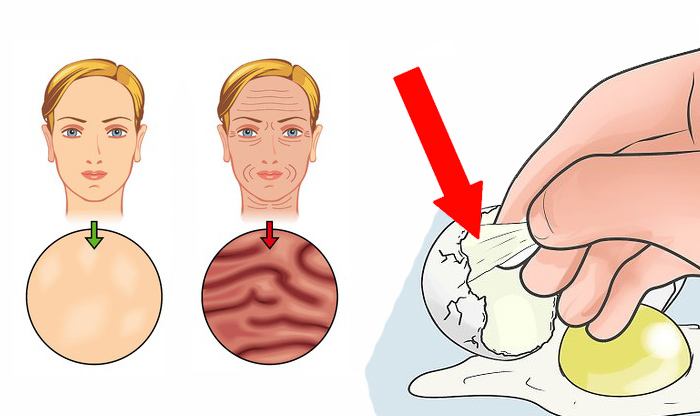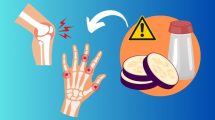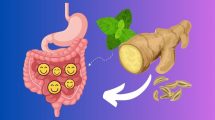The most abundant protein found in the bones, skin, tendons, and muscles, collagen is vital for supporting various structures in your body. Collagen aids in making your skin smooth, young, and elastic, as well as in replacing dead skin cells. The lack of collagen can lead to a great number of skin problems along with some skin and teeth health issues.
Although the body produces collagen itself, the process slows down as you age. You may start noticing the signs of collagen deficiency as early as in your 20s. So make sure you recognize these signs and incorporate more collagen-rich foods into your weekly eating plan.
1.Loss of natural fullness
Why did children and teens have naturally plump cheeks and smooth skin? Youthful skin has a natural fullness and beauty that add volume to the face. As you age, that natural fullness starts to quickly disappear, especially when your body craves collagen. Chubby cheeks of a child radiate youth. If you’ve noticed that your face has lost some fullness, your under eye area begins to develop hollows, and your cheeks are a bit flat, it’s a red flag. Collagen supplementation is often prescribed in this case, but it’s always best to get it from natural sources (read till the end).
2.Degeneration and joint pains
Skeleton legs that hurt when you walk or run is another signs your body lacks collagen. Many elderly people have skeleton legs, hands, and overall body because of an extreme collagen loss. If you’re in your 20s or up and you have skeleton legs and suffer from joint pain, see your doctor to find out whether it’s a collagen deficiency or a sign of serious diseases like cancer. When you lose collagen, your ligaments and tendons start moving with less ease, causing swollen joints, stiffness, and more. But if you experience other health symptoms, this might be something more serious than a collagen deficiency.
Join Agogo Newsletter
And get Updates for Better Health.
3.Sagging skin
Collagen gives the skin its firmness and a lack of it can cause sagging skin, especially around the jawline, cheeks, butt, and stomach. Even expensive lotions that promise to fight sagging skin won’t help you to solve the problem until you restore your collagen balance within the body.
4.Wrinkles and fine lines
Many girls in their early 20s have fine lines and wrinkles. Stress is the major culprit, but a lack of collagen may be a reason too. Dehydration makes those fine lines worse, so it’s important to consume collagen-rich foods along with drinking plenty of water. If you ignore the problem, those little fine lines can turn into the full-blown wrinkles that are impossible to treat without a surgery.
5.Unhealthy hair and hair loss
Thin hair and rapid and intense hair loss are other indicators of collagen deficiency. As a result of decreased collagen, your hair might split and break off and is extremely hard to restore or regrow. Weak hair health is usually accompanied by bad nail health, acne, rashes, and other skin problems.
6.Leaky gut syndrome
Collagen helps to soothe your gut’s lining by breaking down the proteins, healing damaged cell walls. When harmful toxins are able to pass through the digestive tract, they lead to the leaky gut syndrome as well as acid reflux, irritable bowel syndrome, ulcerative colitis, and Crohn’s disease. Poor gut health contributes to the whole body inflammation. As a result, you start suffering from different diseases and experiencing chronic fatigue and insomnia.
Collagen helps to form the connective tissue, sealing and healing the protective lining of your gastrointestinal tract. Increasing your collagen consumption can help you treat the most common gastrointestinal disorders and symptoms, including leaky gut syndrome. Moreover, collagen helps with the water absorption within the intestines, preventing constipation and keeping things moving well.
7.Slow metabolism
The problem with a slow metabolism is that you’re more prone to weight gain, glucose spikes, thyroid disease, and hormonal disorders. Collagen helps to convert essential nutrients and add lean muscle mass to your frame. This contributes to a faster metabolic rate and lower risk of getting sick.
8.Poor teeth
Collagen protein plays a crucial role in anchoring your teeth to gums. Collagen deficiency can loosen your teeth, causing toothache and premature destruction of your teeth.
9.Problematic blood vessel walls
Lack of collagen in the body can negatively affect your blood vessels. The major symptoms include dry eyes, chest pain, frequents headaches, breathing difficulty, and skin rashes, among the others.
10.Poor memory and sleep disorders
Glycine, an important element of collagen, can play a key role in your brain function. Plus, it helps improve sleep and prevent sleep disorders, including insomnia. Increased level of collagen in the body will boost your memory capacity and improve mental acuteness.
How to Get Collagen Naturally
Collagen supplementation is all the rage right now, but supplements contain additives and chemicals that can cause some allergic reactions or worsen the symptoms of the disease you might be suffering from. Rather than supplement your body, add these all-natural collagen-rich foods to your diet:
1.Chia seeds
One of the best sources of the plant-based omega-3 essential fatty acids, chia seeds boast powerful anti-aging properties and aids in building healthy skin cells.
2.Avocado
Avocado itself doesn’t contain collagen. However, it does a great job! Being high in vitamin E, eating avocado regularly prevents collagen breakdown, improving the health of your skin cells. Moderate avocado consumption can also stimulate your body to produce collagen naturally.
3.Pumpkin seeds
Pumpkin seeds are an excellent source of zinc, which acts as a cofactor for the collagen synthesis. Pumpkin seeds can prevent collagen breakdown and maintain healthy cell membranes, contributing to overall skin health. Zinc in pumpkin seeds also helps to speed up wound healing and fight adult acne. Moderation is important here since the seeds are high in fats and calories.
4.Tomatoes
Lycopene found in tomatoes has been proven to protect the skin from sun damage and slow down collagen breakdown. Moreover, tomatoes are loaded with a number of other potent antioxidants – especially vitamin C – that protect your skin at a cellular level.
5.Mixed berries
Almost all berries contain ellagic acid, a nutrient that has been shown to delay collagen breakdown from UV damage. Eating berries daily can help your body to produce more collagen, reducing any signs of premature aging. Vitamin C found in most berries helps to link certain amino acids together for natural collagen formation.
6.Eggs
Surprised? If you only eat whites, you’re missing a serious natural source of collagen. The eggshell membranes and yolk contain collagen. Eating an organic whole egg will stimulate collagen production due to high sulfur level. Sulfur keeps phase II liver detox, the type of detoxification where your body tries to combat environmental toxins, which interfere with the production of collagen and break it down.
7.Citrus fruits
Citrus fruits are plentiful in vitamin C, a powerful antioxidant that aids in the amino acid linking needed to form natural collagen, like proline, a critical nutrient in the phase of pre-collagen production. Don’t overdo it, though. Citrus fruits can cause breakouts, acne, allergic reactions, and stomach pain if you consume them too much.
Vitamin C helps with skin cell repair and quick regeneration, as well as protects against toxins found in the water, air, and food that contribute to breaking down natural collagen and damaging the entire skin’s inner layer.
8.Leafy greens
Prevent collagen breakdown by having a bowl of fresh leafy green salad. Leafy greens are a natural source of chlorophyll, which boosts the precursor to collagen (known as procollagen) in the skin. Thanks to their strong antioxidant content and a diversity of nutrients, leafy greens help to protect your body against UV damage and fight the free radicals from toxins that often lead to premature aging and joint health.
9.Bone broth
If you don’t go vegan, this source of collagen is a great option for you. Not only does bone broth contain essential nutrients, but it has a bioavailable form of collagen in it, making it a healthier alternative to collagen supplements.
As you can see collagen isn’t found in your night cream only. Your body can produce it naturally. You just need to stimulate the collagen production to enjoy a smooth and clear skin, great memory, sound sleep, luxury hair, and more. If you decide to try a collagen supplementation, be sure to consult your doctor first.
References:
- https://www.ncbi.nlm.nih.gov/pubmed/25989472
- https://www.ncbi.nlm.nih.gov/pubmed/1676360
- https://www.ncbi.nlm.nih.gov/pubmed/11340098
- https://www.ncbi.nlm.nih.gov/pmc/articles/PMC3673383/


